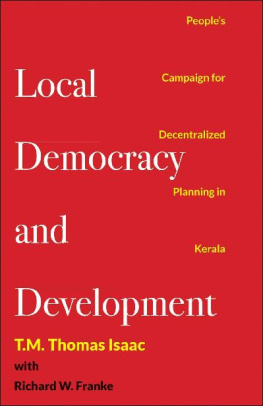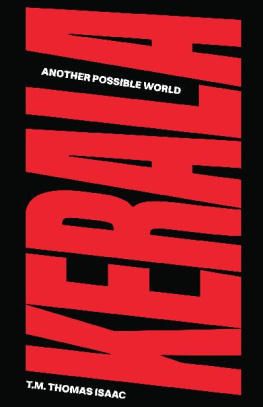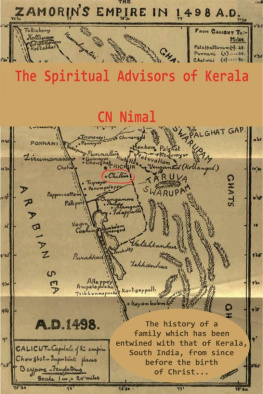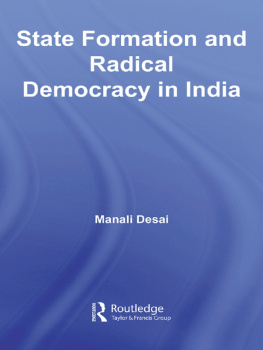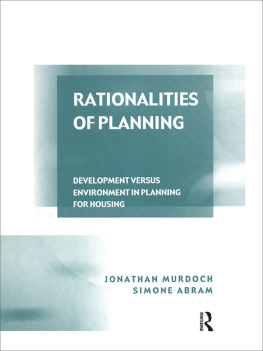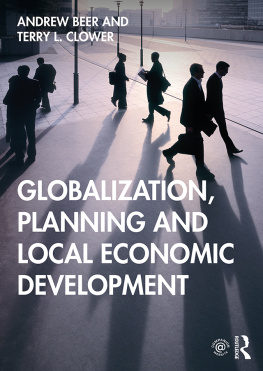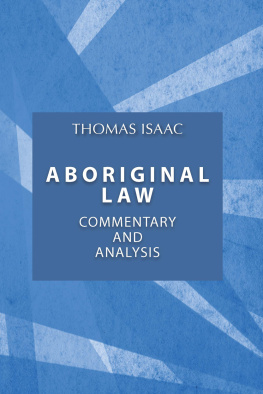The state of Kerala, well known for its history of social mobilization for better education, healthcare, public distribution of food and for fundamental structural changes such as land reforms, is witnessing yet another mass movement, this time for realising the ideals of democratic decentralization. The Left Democratic Front government, which came to power in 1996, decided to devolve 3540 per cent of its Ninth Plan outlay for projects and programmes to be formulated and implemented by local self-governments. A mass movementpopularly known as Peoples Campaign for Decentralized Planningwas then launched to empower local self-governments to prepare plans in a transparent and participatory manner. The campaign was also expected to generate pressure from below to bring about necessary institutional reforms corresponding to the scale of devolution. Vital to the success of the programme was the generation of a new democratic civic culture. Thus, the process of decentralization ceased to be merely an issue of administrative reforms but became an object of mass mobilization and popular politics.
Decentralization of governance is advocated today by people of widely different persuasions, from the World Bank to Third World nationalists. This underscores the fact that even though decentralization is an ideal in its own right, its instrumental significance depends upon the linkages with the larger socio-political context. In the case of Kerala, democratic decentralization is part of a larger struggle for self-reliance and an attempt to solve some of the most keenly felt needs of the people through mass participation. The intensely participatory, activist and empowering nature of Keralas decentralization experiment makes it worthy of study by advocates of democracy everywhere. Local Democracy and Development attempts to document its evolution so far and make an interim assessment of its results.
The book documents and assesses an ongoing process in which Thomas Isaac, as member-in-charge of Decentralization in the State Planning Board, was closely involved, both at the design and implementation stages. It is not, however, a narrative of personal experiences. Collective assessments made by the key actors in the campaign as expressed in the responses to questionnaire surveys and during review discussions have also been incorporated. These questionnaires and other materials have helped campaign organizers in rethinking their plans while creating a database for an analysis such as the one attempted here. Written by an insider to the campaign, this book records the process through which the campaign unfolded. It documents the mistakes committed and corrected, chances taken and policies created.
In 1993, we decided to collaborate on a book on what we then described as new democratic initiativesa number of participatory developmental experiments that attempted to address the development crisis in the state. The first case study grew into the book, Democracy at Work in an Indian Industrial Co-operative: The Story of Kerala Dinesh Beedi (Thomas Isaac, Franke and Raghavan 1998). Another of our case studies was the Kalliasseri Experiment in Local Level Planning undertaken by Kerala Sastra Sahitya Parishad (KSSP). It also developed into a substantial report with one of us as the principal author (Thomas Isaac et al. 1995). The Peoples Planning Campaign was launched in 1996 and we decided to continue our collaboration to document the campaign.
In the hectic work schedule of the campaign, writing a book required more than the usual assistance. The list of acknowledgements could go on for pages and therefore we can mention only a few among them. However, we have not forgotten the help of those who are not mentioned here.
We deeply appreciate the keen interest taken by Professor I. S. Gulati, Vice-Chairman, State Planning Board, in the progress of the book. In fact, the broad framework of the present work was laid out in a detailed report of the campaign co-authored by him and Thomas Isaac (I.S. Gulati and Thomas Isaac 1998). He took time to carefully go through the drafts of the various chapters of the present work.
In NovemberDecember 1998, Thomas Isaac was a visiting scholar at Montclair State University where he worked with Richard W. Franke, drafting the main chapters. The manuscript stayed untouched in its draft form for nearly a year. In January 2000, Thomas Isaac was a visiting scholar at the Havens Center of the University of Wisconsin to participate in one of the Real Utopias Project seminars directed by Erik Olin Wright. This occasion was used to revise and update the manuscript. Comments by participants of the conference, particularly Archon Fung, Erik Olin Wright and Patrick Heller are gratefully acknowledged.
We wish to place on record the cooperation from the members of the State Planning Board, E.M. Sreedhran, B. Ekbal, K.N. Shyama Sundaran Nair and M.K. Sambamurthy. We would also like to acknowledge the cooperation we received from S.M. Vijayanand, K.M. Abraham, K.N. Kurup and Kamal Kutty, senior officers of the Government of Kerala.
We have freely drawn from the discussions with and opinions expressed by the key organizers of the campaign. We wish to thank members of the Peoples Campaign Cell at the State Planning Board, especially V.G. Manamohan, Joy Elamon, N. Jagajeevan, P.K. Raveendran, M.K. Prasad, A.R. Velayudhan Pillai, Ajith Bhaskar, N. Ramakantan, K.M. Shahajahan, Resy George, Ajay Varma, L. Sukumaran Nair, P. Madhusoodanan Pillai, A.S.K. Nair, B. Vijayakumar, M. Rajamohan, Sreekumar and T.N. Seema. The database on plan finances of local bodies was prepared and analysed by Nirmala Sanu George. Udhai B. managed the database of the surveys and biodata forms used in the book. He also bore the brunt of typing the revisions. E. Sivaramakrishnan, T. Kamalam and P. Krishnan extended assistance in going through the extensive documentation of the campaign. P. Radhika worked overtime to do the final editing.
Professor Chandan Mukherjee, Director, Centre for Development Studies, has always been cooperative and understanding of the demands of action-research. We have benefited from the comments from Michael Tharakan, John Kurien, Mridul Eapen, K.N. Harilal, K.N. Narayanan Nair, K.K. Subramaniam, P. Mohanan Pillai, K. Kunjaman, D. Narayana, P.V. Unnikrishnan and Sreekumar Chattopadhyay. Vikas Rawal gave detailed comments on statistical analysis. Manjula and P. Shaheena went through the manuscript and provided useful comments.
Frankes research visits to Kerala and other essential project costs were financed in part by the Montclair State University Global Education Center, the Separately Budgeted Research Programme, the Faculty Scholarship Incentive Programme, the Career Development Programme, and by the Geraldine R. Dodge Foundation of Morristown, New Jersey. Among the many persons in Montclair who worked hard to help put the manuscript together, we thank Barbara H. Chasin, Elana Behar, Kerri Grap, Laura Paynton, Elizabeth Potter, and Rich Meyers.


